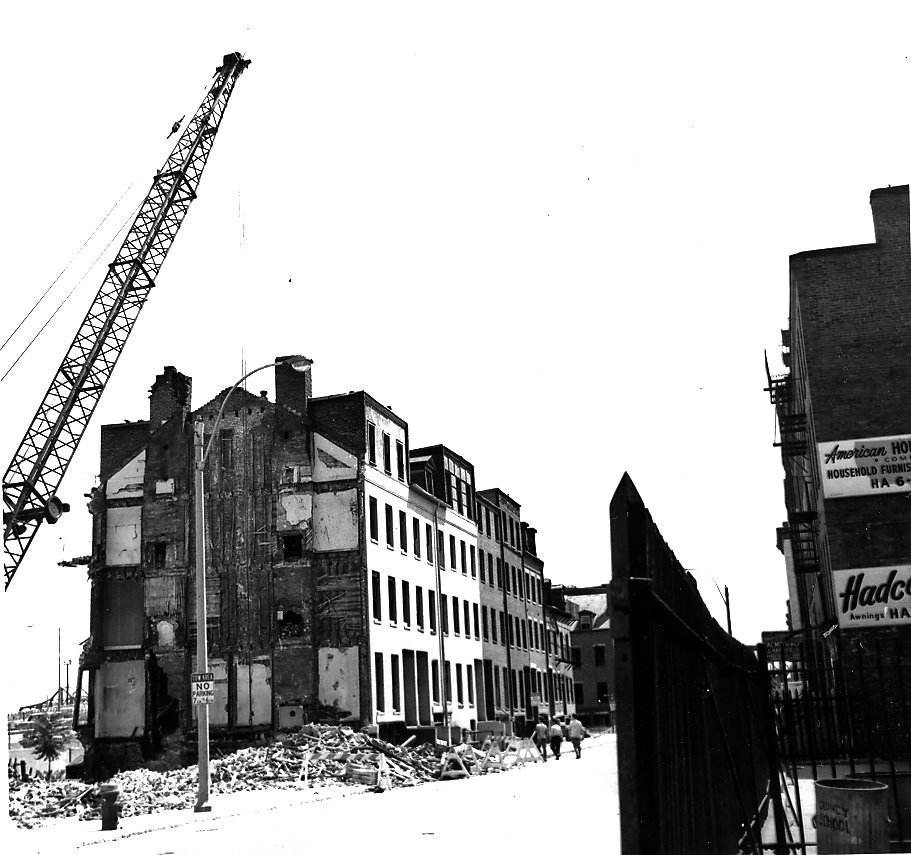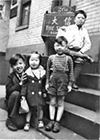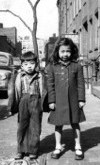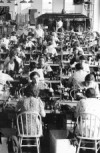Author: Cynthia Yee, 2008
Reprinted with permission from the author.
It is a cold and damp spring day, a day that is like many other March days in this old city of Boston. I was once ocean water lapping against the shores. Seven hills there were in this city and they were leveled to make me. I am filled in land. As such, my life is transient. Salt water I may return to again someday. Yet I have loved and seen much.
My name is Hudson Street. The Chinese street signs call me the “Street of the God of Beggars.” I have no idea why since there are no beggars who live on me. I have a row of red brick row houses with three windows across each floor and each house of four stories or so tall. In the lap of my row houses mothers sit and chat on hot summer nights. While mothers sew on their machines inside the houses during the day, the children play flip-up baseball cards on the stoops and card games like Fish, Rummy, and War. Sometimes they just sit on the lap of my row houses and talk. Fathers all dressed up march down towards the other end of me everyday at 2:00 to meet each other for coffee and exchange of news before going to work in the restaurants.
I have seen many things from where I sit. They are starting to build a highway behind me. There is also a Greek church on me and they have nice processions with music and candles and singing. It is such a solemn feeling I have when I see them. But what I like most are the singing and chanting and laughter of children and the sound of mothers hanging out of their windows calling their children to meals. Oh, there it goes, it’s time for lunch, “Hep-ah! Hek fan lah!” followed by children yelling “Hey, Hep, your mother wants you. Time to eat!” And what smells, the aroma of delicious southern Chinese Tai-san country cooking. Fragrant fermented bean sauces, ginger and scallions and garlic, salted fish…ah…I take a deep breath. Heavenly perfume…
I see the little girl riding her little red tricycle. I have watched her grow up. I remember when she was born and they brought her home to house No.133. I see that she is outgrowing her tricycle so it is harder for her to move it along. Her knees touch the handlebars as she pedals. But she likes to ride it along taking in the sights and occasionally stopping to chat or just look. This little girl also likes to run and race down my pavement. She touches my streetlight yelling out “I win!” when she races that long legged boy. All my days are happy days as the people who live on me are good neighbors. Except for two families, they all speak the same musical language and come from the same land across the ocean waters.
But one day, the families start moving out. No. 120, 118, 116, 114, 112, then 133, 131, 129, 127, 125, 123, 121…please, don’t go. I see the sewing machines being carried out. I am shocked and sad. Why are my happy children no longer singing and chanting rhymes? No one is jumping rope and playing volleyball anymore. No one is bicycling. One by one they move out all their belongings. The little girl with the tricycle moves out but leaves that red tricycle here. She comes back once to visit and I see her crying inside the row house where she once lived, the one numbered 116.
Now, all my days and nights are lonely and sad. It is quiet, very quiet. There are no voices, no singing, and no calling to meals. I have been abandoned. For one year I live like this, in an eerie silence.
Then, one day, I see the wrecking ball. OUCH! All my row houses are knocked down crumbled into piles of debris. Giant shovels remove my bricks and pavements. Black tar asphalt, hot and steamy, rolls over me.
Fast cars and trucks now ride over me. The only sounds I hear are the sound of tires rushing over me.
And I cry. And I remember those happy children and I wonder…
Where did they all go? And why did they leave?



